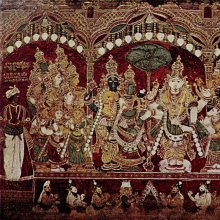Anayaka, Anāyaka: 13 definitions
Introduction:
Anayaka means something in Buddhism, Pali, Hinduism, Sanskrit, Marathi. If you want to know the exact meaning, history, etymology or English translation of this term then check out the descriptions on this page. Add your comment or reference to a book if you want to contribute to this summary article.
Images (photo gallery)
In Buddhism
Mahayana (major branch of Buddhism)
Source: academia.edu: A Study and Translation of the GaganagañjaparipṛcchāAnāyaka (अनायक) refers to “(those who are) without a leader”, according to the Gaganagañjaparipṛcchā: the eighth chapter of the Mahāsaṃnipāta (a collection of Mahāyāna Buddhist Sūtras).—Accordingly, “Then the Bodhisattva Gaganagañja, having praised the Lord with these verses, addressed himself to the Lord: ‘[...] The Lord, having awakened through his own power (svayaṃbhū), entered into the state of perfect awakening by him self (svayam) to the total reality (dharmadhātu) without a teacher (anācāryaka). The Lord is the leader (nāyaka), and teaches the right way to those on bad ways without any leader (anāyaka). [...]’”.

Mahayana (महायान, mahāyāna) is a major branch of Buddhism focusing on the path of a Bodhisattva (spiritual aspirants/ enlightened beings). Extant literature is vast and primarely composed in the Sanskrit language. There are many sūtras of which some of the earliest are the various Prajñāpāramitā sūtras.
Languages of India and abroad
Marathi-English dictionary
Source: DDSA: The Molesworth Marathi and English Dictionaryanāyaka (अनायक).—n S anāyakī f S Absence of government or rule; anarchy, state of interregnum.
--- OR ---
anāyaka (अनायक).—a S That is without ruler or head--a kingdom.
Marathi is an Indo-European language having over 70 million native speakers people in (predominantly) Maharashtra India. Marathi, like many other Indo-Aryan languages, evolved from early forms of Prakrit, which itself is a subset of Sanskrit, one of the most ancient languages of the world.
Sanskrit dictionary
Source: DDSA: The practical Sanskrit-English dictionaryAnāyaka (अनायक).—a. Without a leader, disorderly.
Source: Cologne Digital Sanskrit Dictionaries: Edgerton Buddhist Hybrid Sanskrit DictionaryAnayaka (अनयक).—adj., f. °ikā (from anaya, misfortune; not recorded), unfortunate, unhappy: anāyikeyaṃ praja sarva- duḥkhitā Saddharmapuṇḍarīka 162.1 (verse). I interpret with Kern (Transl.) except that he derives from an-āya; I regard ā as m.c. for a. Burnouf without protector, a-nāyaka.
--- OR ---
Anāyaka (अनायक).—(?) , f. -ikā, according to Burnouf without any protector (Buddha): Saddharmapuṇḍarīka 162.1; but see s.v. anayaka.
Source: Cologne Digital Sanskrit Dictionaries: Benfey Sanskrit-English DictionaryAnāyaka (अनायक).—adj., f. kā, deprived of or wanting a guide, a commander, a ruler, [Rāmāyaṇa] 2, 14, 52; 79, 3. Ku-nāyaka, adj. having a bad guide, [Bhāgavata-Purāṇa, (ed. Burnouf.)] 5, 13, 2.
Anāyaka is a Sanskrit compound consisting of the terms a and nāyaka (नायक).
Source: Cologne Digital Sanskrit Dictionaries: Cappeller Sanskrit-English DictionaryAnāyaka (अनायक).—[adjective] without a leader or protector.
Source: Cologne Digital Sanskrit Dictionaries: Monier-Williams Sanskrit-English DictionaryAnāyaka (अनायक):—[=a-nāyaka] mf(ā)n. having no leader or ruler, disorderly.
Source: Cologne Digital Sanskrit Dictionaries: Goldstücker Sanskrit-English DictionaryAnāyaka (अनायक):—[bahuvrihi compound] m. f. n.
(-kaḥ-kā-kam) Without a leader, without a ruler or chief. E. a priv. and nāyaka.
Source: Cologne Digital Sanskrit Dictionaries: Yates Sanskrit-English DictionaryAnāyaka (अनायक):—[a+nāyaka] (kaḥ-kā-kaṃ) a. Having no leader, confused.
Source: DDSA: Paia-sadda-mahannavo; a comprehensive Prakrit Hindi dictionary (S)Anāyaka (अनायक) in the Sanskrit language is related to the Prakrit word: Aṇāyaga.
[Sanskrit to German]
Sanskrit, also spelled संस्कृतम् (saṃskṛtam), is an ancient language of India commonly seen as the grandmother of the Indo-European language family (even English!). Closely allied with Prakrit and Pali, Sanskrit is more exhaustive in both grammar and terms and has the most extensive collection of literature in the world, greatly surpassing its sister-languages Greek and Latin.
Kannada-English dictionary
Source: Alar: Kannada-English corpusAnāyaka (ಅನಾಯಕ):—[adjective] not having a leader; captainless; kingless.
Kannada is a Dravidian language (as opposed to the Indo-European language family) mainly spoken in the southwestern region of India.
See also (Relevant definitions)
Starts with: Anayakalai, Anayakam, Anayakatva.
Ends with (+99): Agranayaka, Ahindranayaka, Ajyapanayaka, Akrantanayaka, Amaranayaka, Amartyanayaka, Amlanayaka, Anukulanayaka, Aryamargapudgalanayaka, Ashtanayaka, Ashtavidhaputagaranayaka, Asuranayaka, Aupanayaka, Avanayaka, Balanayaka, Bhaskaranayaka, Bhattanayaka, Bhimanayaka, Bhulokasuranayaka, Bhutanayaka.
Full-text: Anayaga, Nayika, Anayakam, Nayakina, Anayika, Nayaka, Sripadastane, Kitava, Kumarga, Pratipanna, Samyag-marga, Anacaryaka, Margadeshika.
Relevant text
Search found 5 books and stories containing Anayaka, A-nayaka, A-nāyaka, Anāyaka; (plurals include: Anayakas, nayakas, nāyakas, Anāyakas). You can also click to the full overview containing English textual excerpts. Below are direct links for the most relevant articles:
A Fine Vijayanagar < [April – June, 1983]
Studies in Rajput Painting < [July-August, 1929]
South Indian Portraits: III, IV < [March, 1928]
Sanskrit sources of Kerala history (by Suma Parappattoli)
5. The Kama-sandesa by Matridatta < [Chapter 4 - Traces of Historical Facts from Sandesha Kavyas and Short poems]
Bhajana-Rahasya (by Srila Bhaktivinoda Thakura Mahasaya)
Text 9 < [Chapter 8 - Aṣṭama-yāma-sādhana (Rātri-līlā–prema-bhajana sambhoga)]
Kautilya Arthashastra (by R. Shamasastry)
Chapter 6 - The Array of the Army < [Book 10 - Relating to War]
The history of Andhra country (1000 AD - 1500 AD) (by Yashoda Devi)
Part 50 - A New Family of the Telugu Cholas (Nellore) < [Chapter XX - The Telugu Cholas (Chodas)]
